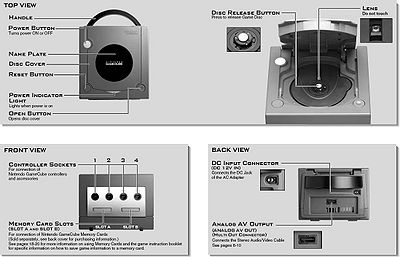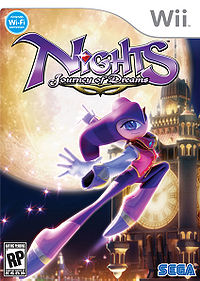From NintendoWiki, your source on Nintendo information. By fans, for fans.
GCN
Nintendo GameCube
ニンテンドーゲームキューブ Nintendō Gēmu Kyūbu
|
|
|
| No. of games
|
640 (as of August 14, 2007)
|
| No. of launch titles
|
{{{launch_games}}}
|
| Best-selling game
|
Super Smash Bros. Melee (7.09 million copies as of March 10, 2008)
|
| Last game
|
Madden NFL 08 (August 14, 2007)
|
|
|
|
|
|
|
| Launch date
|
- NA - November 18, 2001
- JP - September 14, 2001
- EU - May 3, 2002
- AUS - May 17, 2002
|
| Discontinue date
|
2007
|
| Units sold
|
- Worldwide - 21.74 million
- NA - 12.94 million
- JP - 4.04 million
- EU/AUS - 4.77 million
|
|
|
|
The Nintendo GameCube (Japanese: ニンテンドーゲームキューブ), officially abbreviated GCN or NGC is Nintendo's sixth-generation home console. The console was released on September 14, 2001 in Japan, November 18, 2001 in North America, May 3, 2002 in Europe, and May 17, 2002 in Australia. It is a powerful system, with a compact design, four controller ports, a controller with an ergonomic design, small but large-capacity discs, a large game library, connectivity with the Game Boy Advance and a form of online play. The console's surface has three buttons on top: Open, Reset, and Power. In 2006, it was succeeded by Wii, which also features ports for most GameCube hardware as well as compatibility for its software. The system's lifespan ended in 2007.
There were four colors that the Nintendo GameCube was released in: Purple, Black, Orange, and Silver.
A special version of the GameCube was released by Panasonic with the ability to play DVDs and audio CDs as well as GameCube games. It was named the Panasonic Q and was only available in Japan.
Features
The GameCube console is capable of hosting up to four player games with its four controller ports. One such four player title is The Legend of Zelda: Four Swords Adventures. As the system was a disc player instead of a cartridge based console, separate memory cards had to be purchased to save game data. Only two slots were available for memory card usage. GameCube discs are smaller than the industry standard of 5 inches, the smaller discs measured 3.5 inches in diameter.
Development
The GameCube's codename during development was "Dolphin".
System specs

Overview and labeling of GCN external components (click to enlarge)
- MPU ("Microprocessor Unit")*: Custom IBM Power PC "Gekko"
- Manufacturing process: 0.18 micron IBM copper wire technology
- Clock frequency: 485 MHz
- CPU capacity: 1125 Dmips (Dhrystone 2.1)
- Internal data precision: 32-bit Integer & 64-bit floating-point
- External bus: 1.3GB/second peak bandwidth (32-bit address space, 64-bit data bus 162 MHz clock)
- Internal cache L1: instruction 32KB, data 32KB (8 way) L2: 256KB (2 way)
- System LSI: Custom ATI/Nintendo "Flipper"
- Embedded frame buffer: Approx. 2MB sustainable latency : 6.2ns (1T-SRAM)
- Embedded texture cache: Approx. 1MB sustainable latency : 6.2ns (1T-SRAM)
- Texture read bandwidth: 10.4GB/second (Peak)
- Main memory bandwidth: 2.6GB/second (Peak)
- Pixel depth: 24-bit color, 24-bit Z buffer
- Image processing functions: Fog, subpixel anti-aliasing, 8 hardware lights, alpha blending, virtual texture design, multi-texturing, bump mapping, environment mapping, MIP mapping, bi-linear filtering, trilinear filtering, anisotropic filtering, real-time hardware texture decompression (S3TC), real-time decompression of display list, HW 3-line deflickering filter.
Games
Accessories
Reception

|
This article is a stub. You can help NintendoWiki by expanding it.
|
See also
Category:Consoles
|
|
|
|
|
|
| Other
|
| Standalone consoles
|
Arcade
|
Pokémon
|
Classics
|
Cancelled
|
|
|
|
|
|
|
|
3rd Party game test
(stub exit to: non NIWA member affiliate/Wikipedia)
| NiGHTS: Journey of Dreams
|
| ??
|

Boxart for NiGHTS: Journey of Dreams
|
|
|
|
| N. America:
|
November 18, 2007
|
| Japan:
|
December 13, 2007
|
| Europe:
|
January 25, 2008
|
| Australia:
|
N/A
|
| S. Korea:
|
N/A
|
|
|
|
Blurb
Story
Gameplay

|
This article is a stub. You can help NintendoWiki by expanding it.
|
Category: 2007 games
Category:3rd Party games
Category:Wi-Fi games
Category:Wii Wi-Fi games
Category:Wii games
Category:SEGA games
Category:Games
Category:Stubs
Console Nav Template








